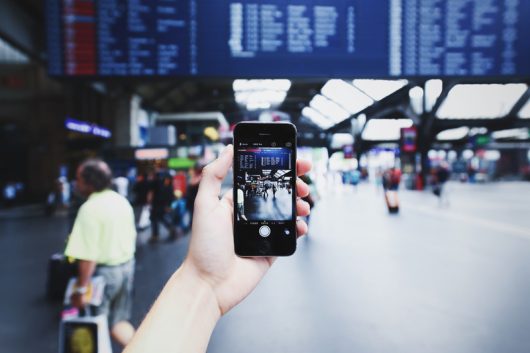Discover these 3 tips to improve your productivity at work

Among the self-employed, there is one category of atypical coworkers: working globe trotters. Ansley Sawyer is one of those digital nomad workers who travels the world as part of her work. We invite you to discover her testimony (originally published on Sharedesk) on how working around the world can teach you a lot about productivity.
“For the past two and a half years, I have been working as an independent and nomadic producer at Unscripted.com. I travel from one country to another every three to five weeks working on various creative projects. I don’t have a fixed place to live – I am what some people call a “digital nomad”.
I love being able to choose my next destination based on the weather, festivals or exotic cuisine. I traveled for years doing countless odd jobs before finding an effective way to earn money, travel and build my career at the same time. I didn’t understand it right away, but being able to travel the world while growing up as a professional is an exciting opportunity.
Apparently, teleworking is becoming very popular. In fact, 74% of workers have changed the way they work in order to be less linked to their physical workplace. It’s fantastic to see more and more people taking the plunge. Coworking contributes to improving employee morale and productivity, while reducing operating costs for the employer.
One of the problems I have encountered is that coworking is still in its infancy in less developed countries. Thus, during filming in different places such as rural Mongolia, Colombia, Cuba and Malaysia, I often had difficulty finding the resources I needed most. And there are always complications: power outages, political instability, unpredictable weather conditions and communication problems.
There is little to do to overcome these problems, so I focus instead on maximizing my productivity when I travel to a new place. The three most important skills I have learned as a nomadic worker are: 1) expressing basic needs, 2) asking for help when you need it, and 3) taking time to enjoy the best moments.
1/ Expressing basic needs
When I travelled as a simple tourist, I only needed the Internet to update my profile on social networks and my blog. Now that I work remotely, I need the best possible Wi-Fi connection to do my job properly. So, I need to download all my videos after a shooting so that customers can watch them and return to me, or simply to save my images in case my hard drive doesn’t survive a storm (… it actually happened to me). Waiting hours to download my images when you have a poor Internet connection can turn into days of lost productivity. It is important that I put on my side all the chances of success (in this case a good internet connection), so that I can concentrate on making a good film.
So when I look for a new coworking space to establish my “base camp”, I start by sending emails indicating my needs:
“My name is Ansley, and I’m a film producer. I am looking for a place to live / work in your city next month, and your space has caught my attention. Because I work online, it is imperative that I can have a fast Internet connection. Go to speedtest.net, press the green button and tell me what the download and upload speeds are…”
People don’t necessarily have the same notion of things as you do. If you ask them how their internet connection is, they will probably answer “our wifi is good”, which can sometimes mean that “yes we have internet, thank you AOL” or that “our basic connection is 35 MBps”. By asking precisely what I need and explaining what I need, I help them to evaluate the resources I need and according to my own standards. This reduces the risk of confusion and frustration for both parties.
When I am looking for a new coworking space, my priority is to find good access to the internet, because it is the resource I need most to make the best film possible. If you are a developer, you may need a clean and quiet space and good natural light. Everyone has the necessary resources to do a good job. Coworking spaces often appreciate it when I take the lead in expressing my needs directly so that we can focus together on finding a solution. For example, this can mean that I download my files at night so that I don’t disturb other users on the network. If a coworking space does not have the resources I need, maybe they can refer me to another local company. By communicating my needs and helping my hosts find a solution, I focus on the real task at hand: making the best possible film.
2/ Ask for help when you need it
As a producer, an essential part of my job is to connect people. The success or failure of a project often depends on whether I can find interesting people to film. At the beginning of a new project, my colleague and I usually start filming in a high-traffic area during sunrise or sunset. In preparation for our film Hong Kong Strong, I arrived in Kowloon two weeks earlier to locate places and detect talents. Immediately, we were confronted with a problem: everyone we were trying to film was systematically asking us to turn off our camera…
Hong Kong Strong from Brandon Li on Vimeo.
There are many socio-political reasons why Cantonese do not like to be filmed in public. As I learned a little more about Chinese culture, I realized that I needed to be introduced personally to each person we filmed and that I needed help. I had to develop my network of friends in Hong Kong, from one person initially to dozens of people in less than two weeks. A real challenge!
I needed to find someone to guide me as I learned more about Hong Kong culture. I started by thinking seriously about who would be the most motivated to help me – friends and fans. I formed a core group of two to five Cantonese speaking friends who helped me every day to discover closed communities that were difficult to meet in Hong Kong. I also asked these new friends to introduce me to everyone they knew (including family). Finally, I connected with as many groups as possible via Facebook, Couchsurfing and Google. The results were amazing: I had built up a new network of more than 200 people, most of whom did not even speak English.
Rather than trying to make these connections by myself, I trusted my friends and network to help me. Because we trusted the locals to introduce us to the “real” Hong Kong, the links that have been forged have allowed us to create a more subtle film.
3/ Take the time to enjoy the moment
I barely remember my first trip to Singapore. A customer needed me to download hundreds of gigabytes of sequences to the cloud within three days. I looked for places with the fibre and the best connection in Southeast Asia and found that Singapore had the best speeds. So I found an AirBnB in the suburbs with the fiber and spent all my time taped to my computer. Yes, I was able to meet my deadlines, but just barely, and I only ventured outside to get food.
Like most entrepreneurs, I have some difficulty dropping off my computer to eat, exercise or sleep. It is tempting to be surrounded by English-speaking expatriates who keep the same irregular hours. Sometimes this method is exactly what I need to work with. However, I have found that once I start to immerse myself in this virtual world that I have built for myself, I lose all motivation for my work.
You can start the project to create a startup anywhere. Whether or not you work when you travel, don’t miss the opportunity. When things get complicated, you have to know how to appreciate the present moment, however volatile it may be. Sometimes it is important to slow down and connect with your environment so that you can return to work with a new perspective. The only thing that prevents you from seeing what is good around you is your lack of motivation to find it.
Once I had submitted my deliverables on time, I realized that I knew nothing about Singapore. I went a few hours before dawn to explore the city before my morning flight to Kuala Lumpur. I then came across a covered Indian market selling fresh meat, flowers and spices at the opening time. I enjoyed a cellar and the scene before my eyes: women haggling, men chatting and a curious dog sniffing my ankle. I realized that this market was open and working every day, opening my eyes to a whole culture of people I would never have met. I had to make an effort to find them.
I remembered that that’s why I was travelling: to broaden my horizons, to review my expectations and simply to see the world. Whether you work in a coworking area near your home or on the other side of the world, take a moment to rediscover what made you fall in love with your work. “
Ansley Sawyer is a producer of nomadic travel films. She has worked in various professions such as sailor, singer, writer and actress, but she is especially fascinated by the search for new ways to explore the world.

